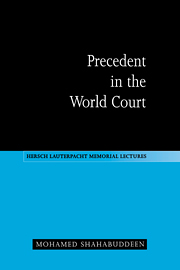Book contents
- Frontmatter
- Contents
- Foreword
- Preface
- List of abbreviations
- 1 Introduction
- 2 The growth of the Court's case law
- 3 Range of precedential resources
- 4 The bases of the system
- 5 The Advisory Committee of Jurists
- 6 The view taken by the League of Nations
- 7 The possibility of judge-made international law
- 8 Stare decisis
- 9 Distinguishing
- 10 Departing from a previous decision
- 11 Ratio decidendi and obiter dictum
- 12 Advisory opinions and decisions of chambers
- 13 The precedential impact of individual opinions
- 14 Effect and scope of the Court's case law
- 15 Conclusion
- Index
3 - Range of precedential resources
Published online by Cambridge University Press: 04 May 2010
- Frontmatter
- Contents
- Foreword
- Preface
- List of abbreviations
- 1 Introduction
- 2 The growth of the Court's case law
- 3 Range of precedential resources
- 4 The bases of the system
- 5 The Advisory Committee of Jurists
- 6 The view taken by the League of Nations
- 7 The possibility of judge-made international law
- 8 Stare decisis
- 9 Distinguishing
- 10 Departing from a previous decision
- 11 Ratio decidendi and obiter dictum
- 12 Advisory opinions and decisions of chambers
- 13 The precedential impact of individual opinions
- 14 Effect and scope of the Court's case law
- 15 Conclusion
- Index
Summary
Accessibility
Building up the law through the use of precedents naturally depends on the accessibility of decisions. As remarked by Hersch Lauterpacht, and recalled above, ‘judicial decisions, particularly when published, become part and parcel of the legal sense of the community’. Decisions which remain unpublished can scarcely release their full precedential force. By way of analogy, one may contrast the several references in the jurisprudence to the published rule-making proceedings of the Permanent Court of International Justice with the absence of similar references to the unpublished rule-making proceedings of the present Court. In relation to arbitral decisions, Jennings recalls a series of lectures delivered by Henry Maine in 1887. In the course of 228 pages, the lecturer, though nurtured in the most notable of all case law systems, referred to but one decided case – the Alabama Claims – even though ‘there were quite a lot of decided cases on international law at the time’. Why so sparing in the use of this valuable resource? The reason was that ‘there was until relatively recent times no international lawyers’ apparatus technicus to make cases easily accessible as material for argument’. So publication is important. It has been undertaken continuously from the commencement of the Permanent Court of International Justice, each decision being made publicly available in printed form as soon as possible after delivery.
- Type
- Chapter
- Information
- Precedent in the World Court , pp. 32 - 39Publisher: Cambridge University PressPrint publication year: 1996

